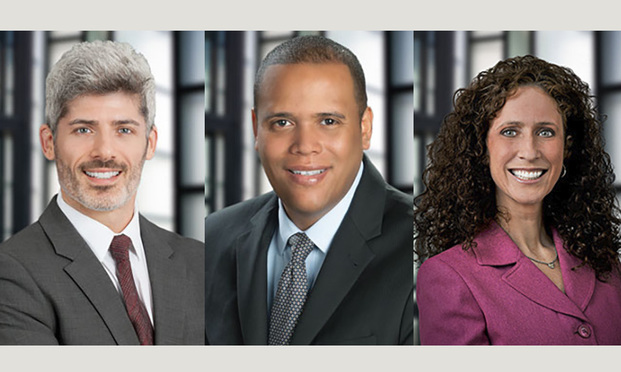South Florida, Atlanta Lawyers Clinch Victory for Internet-Famous 'Salt Bae' in Class Action Over Restaurant Tips
The class action was against Nusret Gokce, commonly known as Salt Bae, and his restaurants, seeking unpaid wages.
June 05, 2020 at 04:54 PM
4 minute read
 (l-r) Jonathan A. Beckerman, Miguel A. Morel and Joelle C. Sharman, partners with Lewis Brisbois in Fort Lauderdale and Atlanta. Courtesy photos
(l-r) Jonathan A. Beckerman, Miguel A. Morel and Joelle C. Sharman, partners with Lewis Brisbois in Fort Lauderdale and Atlanta. Courtesy photos
That 18% service charge on a Brickell restaurant's check isn't a tip for the server, a federal judge ruled in the U.S. District Court for the Southern District of Florida.
The case hinged on whether the service charge on a restaurant bill counted as a tip for the service staff at Nusr-Et Steakhouse in Brickell, who were seeking minimum wage plus overtime. The case turned on whether the service charge was the sole compensation for the service staff as dictated by federal law.
Attorneys Jonathan A. Beckerman, Miguel A. Morel and Joelle C. Sharman, who are partners at Lewis Brisbois in Fort Lauderdale and Atlanta, prevailed for their client—Nusr-Et Steakhouse and its owner, Nusret Gokce, commonly known as Salt Bae after his seasoning technique became an Internet meme—in a class-action lawsuit that sought unpaid wages.
One of the main challenges with lawsuits involving Nusr-Et Steakhouse is that the international restaurant chain has operations in the United States and around the world. That means employees in several countries may have been class members. That factor caused extensive discovery requests for Beckerman and his team.
"We were getting overwhelmed with the amount of paper documents that these guys were just trying to throw at us to make facts and issues that didn't exist," Beckerman said. "Thousands of pages of documents. Any document that was ever generated with the company's financial picture, they wanted."
 Turkish chef Nusret Gokce (Salt Bae).
Turkish chef Nusret Gokce (Salt Bae).The lead plaintiff in the case, Melissa Compere, was a server at the Nusr-et restaurant at 999 Brickell Ave., Miami.
Her attorney Lowell J. Kuvin, a partner at the Law Office of Lowell J. Kuvin in Miami, did not respond to a request for comment
Compere argued that the 18% service charge included on a customer's dinner receipt was a tip, and that she was also entitled to be paid both the minimum hourly wage plus overtime for any week in which she worked more than 40 hours.
U.S. District Court Judge Raag Singhal disagreed and ruled in the restaurant's favor, granting its motion for summary judgment.
"A lot of the service staff were paid in excess of six figures per year, so they weren't getting paid an hourly rate and weren't getting paid overtime," Beckerman said. "They were claiming the service charges were 'tips,' which would be a violation of the law if that was the case."
Beckerman said having the service charge distributed to restaurant workers as their sole compensation is a "completely legal practice," citing federal law — the Retail Sales Exemption under the Fair Labor Standards Act — that Beckerman argued allows an employer not to pay overtime. "If they pay workers enough for commission, no minimum wage," he said.
There are three main rules to exempt an employer from overtime, according to section 7(i) of the Fair Labor Standards Act. First, an employee must earn at least one and one-half times the federal minimum wage. The second rule is that the employee must earn more than half of his or her salary in commissions for a period of not less than one month. The third requirement is the employee must work for a retail or service establishment.
Beckerman argued that the service charge was distributed to the staff at the restaurant based upon a point system, and that was all of the compensation they received. For instance, Beckerman said, if an employee was working as a person who picks up plates and served water, that person might get one point. The main server who took the orders and brought wine to the table would earn three points.
"There's a formula at the end of the night," Beckerman said. "They identify how many people were working, the points they were entitled to and distribute the money based on that payment system. So each point entitled them to a percentage of the overall proceeds from the service charges. [The service people] divide up the overall proceeds from the service charges."
Read the full order on the defendants' motion for summary judgment:
This content has been archived. It is available through our partners, LexisNexis® and Bloomberg Law.
To view this content, please continue to their sites.
Not a Lexis Subscriber?
Subscribe Now
Not a Bloomberg Law Subscriber?
Subscribe Now
NOT FOR REPRINT
© 2025 ALM Global, LLC, All Rights Reserved. Request academic re-use from www.copyright.com. All other uses, submit a request to [email protected]. For more information visit Asset & Logo Licensing.
You Might Like
View All

Did 17 Drinks Lead to Woman's Death? Lawsuit Blames Casino

Not a Happy Birthday: Woman Sues Kyle G's Prime Seafood & Steaks After Severe Food Allergic Reaction
3 minute read
Law Firms Mentioned
Trending Stories
- 1OCR Issues 'Dear Colleagues' Letter Regarding AI in Medicine
- 2Corporate Litigator Joins BakerHostetler From Fish & Richardson
- 3E-Discovery Provider Casepoint Merges With Government Software Company OPEXUS
- 4How I Made Partner: 'Focus on Being the Best Advocate for Clients,' Says Lauren Reichardt of Cooley
- 5People in the News—Jan. 27, 2025—Barley Snyder
Who Got The Work
J. Brugh Lower of Gibbons has entered an appearance for industrial equipment supplier Devco Corporation in a pending trademark infringement lawsuit. The suit, accusing the defendant of selling knock-off Graco products, was filed Dec. 18 in New Jersey District Court by Rivkin Radler on behalf of Graco Inc. and Graco Minnesota. The case, assigned to U.S. District Judge Zahid N. Quraishi, is 3:24-cv-11294, Graco Inc. et al v. Devco Corporation.
Who Got The Work
Rebecca Maller-Stein and Kent A. Yalowitz of Arnold & Porter Kaye Scholer have entered their appearances for Hanaco Venture Capital and its executives, Lior Prosor and David Frankel, in a pending securities lawsuit. The action, filed on Dec. 24 in New York Southern District Court by Zell, Aron & Co. on behalf of Goldeneye Advisors, accuses the defendants of negligently and fraudulently managing the plaintiff's $1 million investment. The case, assigned to U.S. District Judge Vernon S. Broderick, is 1:24-cv-09918, Goldeneye Advisors, LLC v. Hanaco Venture Capital, Ltd. et al.
Who Got The Work
Attorneys from A&O Shearman has stepped in as defense counsel for Toronto-Dominion Bank and other defendants in a pending securities class action. The suit, filed Dec. 11 in New York Southern District Court by Bleichmar Fonti & Auld, accuses the defendants of concealing the bank's 'pervasive' deficiencies in regards to its compliance with the Bank Secrecy Act and the quality of its anti-money laundering controls. The case, assigned to U.S. District Judge Arun Subramanian, is 1:24-cv-09445, Gonzalez v. The Toronto-Dominion Bank et al.
Who Got The Work
Crown Castle International, a Pennsylvania company providing shared communications infrastructure, has turned to Luke D. Wolf of Gordon Rees Scully Mansukhani to fend off a pending breach-of-contract lawsuit. The court action, filed Nov. 25 in Michigan Eastern District Court by Hooper Hathaway PC on behalf of The Town Residences LLC, accuses Crown Castle of failing to transfer approximately $30,000 in utility payments from T-Mobile in breach of a roof-top lease and assignment agreement. The case, assigned to U.S. District Judge Susan K. Declercq, is 2:24-cv-13131, The Town Residences LLC v. T-Mobile US, Inc. et al.
Who Got The Work
Wilfred P. Coronato and Daniel M. Schwartz of McCarter & English have stepped in as defense counsel to Electrolux Home Products Inc. in a pending product liability lawsuit. The court action, filed Nov. 26 in New York Eastern District Court by Poulos Lopiccolo PC and Nagel Rice LLP on behalf of David Stern, alleges that the defendant's refrigerators’ drawers and shelving repeatedly break and fall apart within months after purchase. The case, assigned to U.S. District Judge Joan M. Azrack, is 2:24-cv-08204, Stern v. Electrolux Home Products, Inc.
Featured Firms
Law Offices of Gary Martin Hays & Associates, P.C.
(470) 294-1674
Law Offices of Mark E. Salomone
(857) 444-6468
Smith & Hassler
(713) 739-1250






